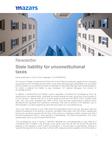
State liability for unconstitutional taxes
The Council of State considered that Article 90 of the Political Constitution applies to the Congress (according to which the State shall be liable for the antijuridical damages attributable to it) and stated that the creation of unconstitutional taxes constituted an antijuridical damage that harmed taxpayers, for which it ordered the Nation to pay Goodyear, for material damages, the amount of $1,443,884,575.22.
In addition, it clarified that such liability is given regardless of whether the Constitutional Court, by declaring the unconstitutionality, modulates its effects towards the past, giving them the character of ex tunc (forever). Having seen this, it is worth studying what was Law 1653 of 2013 (Judicial Tariff Law). This Law, which repealed Law 1394 of 2010 (Law that also implemented a Judicial Tariff), developed and regulated such parafiscal contribution that was conceived in the Statutory Law of Administration of Justice establishing elements that made it an unconstitutional tax.
Thus, Law 1653 (contrary to Law 1394 where the generating event of the tax was given with the effective compliance of the award or sentence, provided it was higher than 200 Smlmv) established that the tax would be caused with the filing of the lawsuit or analogous judicial request and that it should be paid before filing it, under penalty of inadmissibility. The rate to be paid was 1.5% of the taxable base, which could not exceed 200 Smlmv.
The Constitutional Court in Ruling C-166/2014 declared the unconstitutionality of Law 1653 as it considered that it violated: i) the principle of tax equity, since the tax did not consult the payment capacity of the taxpayers, which made it confiscatory, ii) the principle of progressivity, because it required the payment of an equal levy to those with unequal payment capacity and iii) the rights of access to justice, defense and due process, in that it established that the payment of the tax was a prerequisite for access to justice.
The declaration of unenforceability of Law 1653 did not revive Law 1394 because there is a jurisprudential line (whose parent judgment is C-251/2011) that indicates that the revival of repealed norms is only automatic when the norm declared unenforceable generates "a normative vacuum in which the constitutional order may be affected", and once the legal operator weighs between justice and legal certainty. In this case, the Court considered that Law 1394 would continue to exist for those proceedings that had been initiated under its rule, but not for those that were initiated after the declaration of unenforceability of Law 1653.
Thus, regardless of the fact that the ruling on Law 1653 (issued in Judgment C-166 of 2014) did not modulate effects towards the past, based on the thesis of the Council of State, a way is opened for those who have paid the judicial fee referred to in Law 1653 and request its return to the Superior Council of the Judiciary, in case this does not succeed, to sue the liability of the Nation for the antijuridical damage caused, consisting in the issuance of unconstitutional taxes.
The process of direct reparation to claim the patrimonial liability of the State for issuing unconstitutional taxes is a relatively short process since its procedure is oral and no evidence is required, since it deals with a matter of law. There have been many regulations creating taxes that have been declared unconstitutional. Likewise, there have been many benefits and amnesties that have been created, to which taxpayers have availed themselves and that end up being declared unconstitutional (the last of them was Article 163 of Law 1607 that created special rules of occasional gain for taxpayers who declared their omitted assets and non-existent liabilities and that was declared unconstitutional by Ruling C-833/2013).
In this regard, would it not be better, in order to avoid this situation, to issue a Legislative Act amending the Constitution and establishing that tax reforms or rules that create or modify taxes are subject to automatic constitutional review?


